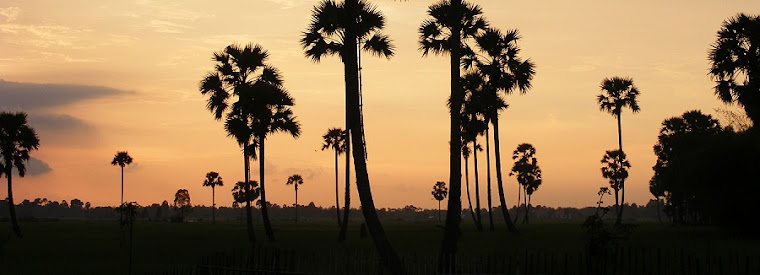My eyes are fixed on the ground in front of me. I am
walking. Each step a test of my stability, my balance, my resolve. I am walking
through waist high grass, ankle deep mud, knee-deep water. The path turns. I am
walking on a narrow raised ridge of slick, muddy clay. A misplaced step in either
direction will land me face first in someone’s rice paddy. Back into the water,
feeling with my bare toes for a footing in the murky depths. My head is down. I
am concentrating so hard that I miss the curious stares of the people we pass
working in their fields. I mumble a reply to their greetings only when I’ve had
time to stop and catch my breath, catch my bearings. I scarcely hear the voices
of the birds calling from the tall grasses.
I am walking, but I am not walking alone. I am following in
the footsteps of an elderly man. A man who has lived and worked here his whole
life, and will continue to work until the day comes when his body goes to rest
and he no longer needs to cultivate the rice which has thus far sustained his
days. His feet move with the steady assurance of one who has walked this path
thousands upon thousands of times. Slowly and surely, he moves forward. Only by
my quick balance the grace of God am I able to stay on my feet, scrambling
through the mud and waters as I try to keep up. He turns around to wait for me.
Steady on, he says, steady on.
We finally arrive at his machamba, his field. They all looked the same to
me, but he knows this field. It is the one he has been carefully and expertly
cultivating for many a year. His Portuguese is limited, as is mine, so we
revert to using gestures. He motions me to copy him and demonstrates how to
thin the rice that was planted a few weeks ago, and transplant the seedlings to
another part of the field. It is long and hard work in the hot, hot sun. The
longer I work, the more I start to worry. Am I doing a good job? What if my technique is off? What if my
inefficiency and inexperienced hands cost someone a meal? But with my tired
legs and slow hands, the amount of work I do is hardly significant.
What is perhaps more significant was my presence at the machamba. People come over to see me. The old man, my host for these
three days of rural farm life, explains my presence to the onlookers their
local dialect. I do not understand a word, but wish I knew what he was saying.
I’m not sure I could have found the words myself to explain what I was doing
there. What did I hope to achieve by going to plant rice for three days? What
did I hope to learn by living off the grid in mud house and transplanting rice
seedlings?
I am bent at the waist, my feet in the mud and my hands in
the mud. Count one, two seedlings and push them into the soft ground with your
thumb. One, two, thumb. One, two, thumb. My mind wanders. I think of everything
and nothing at the same time. My
skin is burning in the sun and the drinking water in my bottle is almost gone.
The old man and I are working side by side now, planting the last of the rice.
I look up, surprised at how far we have come together.
It is the afternoon and time to return to the house. I am
exhausted and we’ve only been working for 4 1/2 hours. We are walking through
the muddy fields. I slip and fall. Embarrassed, I get up again, but no one
laughs at me. We keep walking. We stop and say hello to the woman standing in
her field; a baby at her breast and a hoe in her hand. I look up and see a
little songbird land in a bush nearby. He starts to sing. The old man turns around once more.
Steady on, he says. We are almost home.
 |
| Rice about to be transplanted. It is easier to do when the seedlings are younger and smaller, but things sometimes get delayed or are hard to time with the rains. |
 |
| In the machamba. |
